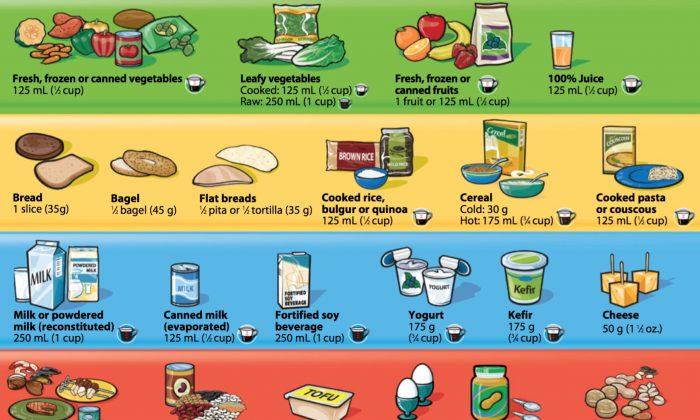On October 24, Health Canada released an online questionnaire to gather the public’s views on Canada’s Food Guide. The government agency is in the process of revising the dietary recommendations on the Food Guide, and it’s about time. The rates of diet-related diseases such as cancer, heart disease, and diabetes are distressingly high, and in 2013, 62 percent of Canadians were overweight or obese.
In school, children are taught that the recommendations on the Food Guide make up the fundamentals of a healthy diet. What they’re not told, however, is that these recommendations were influenced by the dairy, meat, and egg industries (according to a 2012 CBC article).
For example, when the 1992 version of Canada’s Food Guide was released, the meat, dairy, and egg industries successfully lobbied the government to increase the recommended number of servings of these products. You can see the effect that these lobby groups had on the government-endorsed dietary recommendations by looking at the old Food Guides on the Government of Canada website—in 1982, the Food Guide had 2 servings of meat and alternatives and 2 servings of milk; but by 1992, the Food Guide had increased to 2-3 servings of meat and alternatives and 2-4 servings of milk. These new, increased recommendations persist on the Food Guide to this day.
In recent years, science has been finding that meat, dairy, and eggs actually increase the risk of many chronic diseases, while a vegan diet (one that avoids all animal products) is a very healthy way to eat and reduces the risk of developing chronic disease.
Animal protein, cholesterol, and excess saturated fat have been found in numerous studies to be harmful to health. A vegan diet is naturally free from cholesterol and animal protein but can be rich in plant protein, and provides a healthy amount of saturated fat.
It isn’t only activists who are willing to point out the health benefits of veganism. Here are some statements on plant-based diets from just a few high-profile organizations around the world:
- Dietitians of Canada:
- “A healthy vegan diet has many health benefits including lower rates of obesity, heart disease, high blood pressure, high blood cholesterol, type 2 diabetes and certain types of cancer.”
- World Health Organization:
- “Specific recommendations for a healthy diet include: eating more fruit, vegetables, legumes, nuts and grains; cutting down on salt, sugar and fats. It is also advisable to choose unsaturated fats, instead of saturated fats and towards the elimination of trans-fatty acids.”
- The WHO has declared some types of meats to be Group 1 carcinogens (on the same level as with cigarette smoking) and Group 2 carcinogens.
- A study conducted by students at the University of Oxford:
- If the world went vegan, millions of human lives would also be saved due to dramatic reductions in the incidence of chronic disease:
- “A global switch to diets that rely less on meat and more on fruit and vegetables could save up to 8 million lives by 2050, reduce greenhouse gas emissions by two thirds, and lead to healthcare-related savings and avoided climate damages of $1.5 trillion (U.S.)”
- They found that adopting diets in line with global dietary guidelines could avoid 5.1 million deaths per year by 2050. Even greater benefits could come from vegetarian diets (avoiding 7.3 million deaths) and vegan diets (avoiding 8.1 million deaths).
When one considers the health, environmental, humanitarian, and, of course, animal-related reasons to live vegan it is obvious that the government should start supporting it, too. Unfortunately, despite compelling evidence for the widespread adoption of a vegan diet, Canada’s Food Guide currently does not even mention vegetarian or vegan diets.
A U.S.-based organization of medical professionals called the Physicians’ Committee for Responsible Medicine (PCRM) actively promotes a vegan diet as a way to prevent and reverse chronic disease.
They’ve devised a new food guide consisting of “The New Four Food Groups“ of fruit, vegetables, legumes, and whole grains. Why doesn’t Health Canada use PCRM’s science-based nutritional guidelines to formulate the next revision of Canada’s Food Guide?
Health Canada needs to acknowledge the healthfulness of veganism and the ability of vegan diets to prevent many of the chronic diseases that plague Canadians. The recommendation of a vegan diet must be included on the next version of Canada’s Food Guide.
Carolyn Harris is a history student at Carleton University, board member of the National Capital Vegetarian Association, and blogger at VeganForgetMeNots.blogspot.ca.


Friends Read Free